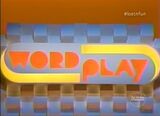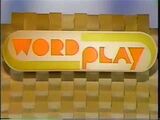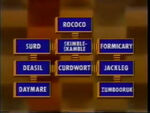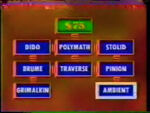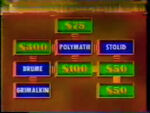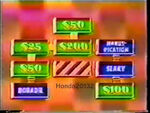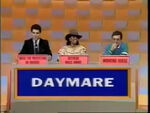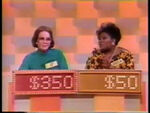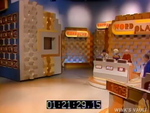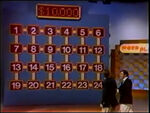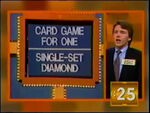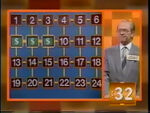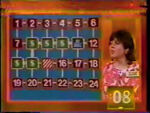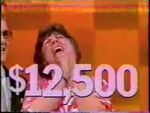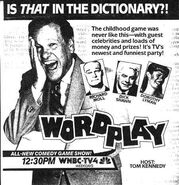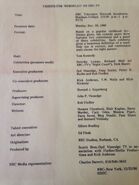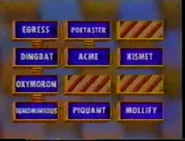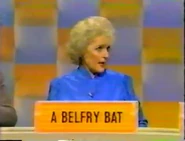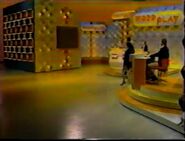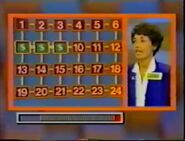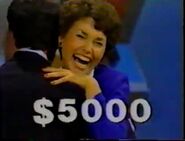| Hosts | |
| Peter Tomarken (Pilot) Tom Kennedy (Series) Jamie Farr (1987, sub) | |
| Announcers | |
| Rod Roddy (Pilot) Charlie O'Donnell (Series) | |
| Broadcast | |
| Pilot: 10/12/1986NBC Daytime: 12/29/1986 – 9/4/1987 | |
| Packagers | |
| Scotti-Vinnedge Productions Fiedler-Berlin Productions Rick Ambrose Productions | |
PILOT OPENING SPIEL:
"Could Pat Sajak hitch his "OXYMORON" to a cart? When Betty White goes "DINGBAT" hunting, does she use a net? Is Stuart Pankin's "KISMET" listed in the telephone book? We'll find out the answer to those questions and a lot more as we play television's funniest new game show… WORDPLAY! And here's your host, the man of many words, PETER TOMARKEN!"
SAMPLE OPENING SPIEL:
"Did Bert Convy have trouble in "POLYMATH" while going to school? If Abby Dalton met a "GRIMALKIN", would it be love at first sight? When Bill Rafferty sees a "BRUME" does he immediately clean his house? We'll find out the answers to these questions and a lot more, as we play television's funniest (new) game show… WORDPLAY! And here's the star of Wordplay, that man of many words, TOM KENNEDY!
Wordplay was a game of words & definitions. It was a show where two contestants faced a panel of three celebrities who gave definitions to wacko & unusual words. The words were all found in Webster's 3rd New International Dictionary.
Gameplay[]
Main Game[]
The game was played with two contestants (the returning champion who sat in the red podium, and the challenger who sat in the yellow podium) and a game board of nine words (the middle column was raised higher than the outer columns). The object of the game was to figure out the definitions to those words. The player in control (starting with the champion or the red player) chose a word and the panel gave three possible definitions to that word (one definition per star) along with humorous stories about the definition. Once the definitions were given, the player had to then choose which definition was correct. A correct choice won a money amount hidden behind the word, but an incorrect choice gave the opponent a chance to choose from the remaining definitions. If the word chosen was connected to previously revealed dollar amounts, the contestant won the combined total of all connected money amounts; if both contestants chose a wrong definition, a block went up and all connections to it were dead. The game was played in three rounds of two words each (meaning that they'll be finding out the definitions to six of the words), and at the beginning of each new round, the unrevealed money amounts were doubled.
Here are the money amounts for each round:
| Round | Amounts | ||
|---|---|---|---|
| 1 | $25 | $50 | $75 |
| 2 | $50 | $100 | $150 |
| 3 | $100 | $200 | $300 |
In addition to the cash, one of the words in the game was a bonus word. The player who picked that and chose the right definition not only won the hidden dollar amount, but also a trip.
The player with the most money at the end of Round 3 won the game and kept the cash. If the game ended in a tie, one last word was played. The celebrities did not give wild stories this time around; they only gave straight definitions. The champion who selected that word could choose to either go for the right definition or pass it to his/her opponent. The correct definition choice won the game, but an incorrect definition gave the opponent the hidden money and the game. The winner of the game won the right to play Double Definitions for a cash jackpot that started at $5,000 and grew by $2,500 for every day it was not won.
Double Definitions (Bonus Round)[]
In the Double Definitions round, the winning player faced a game board of 24 connected boxes numbered 1-24. Behind each box were two definitions to one single word (Ex: Hall Person/Special TV Screen, the word would be monitor). The object of this game was to connect from the left side of the board to the right (ala Blockbusters' Gold Rush/Run) in 45 seconds or less. The champion chose a box and exposed the two definitions behind it; he/she could take as many guesses as needed and as soon as they guessed the right word, a dollar sign ($) appeared in that box and he/she moved on to the next. If the contestant passed on a box, a block went up, and the contestant had to then work his/her way around it. Each correct word/captured box was worth $100, and making the connection won the jackpot. The highest jackpot won was $27,500, and the series' final jackpot won was $7,500.
On the first show, Double Definitions was called Speedword. They renamed it Double Definitions realizing that another game show, Scrabble, already had that name.
Champions stayed on the show until they lost the main game or won three times.
Gallery[]
Press Release[]
Tickets[]
Pilot Pictures[]
Rating[]
Music[]
Pilot - "Hitting Home" - by David Reilly & John Devereaux
Series - Level 22
Studio[]
NBC Studio 4, Burbank, CA
Trivia[]
- Wordplay replaced the long-running soap opera Search for Tomorrow, which moved to NBC from CBS.
- One memorable contestant was former Mickey Mouse Club Mouseketeer Lonnie Burr, who won more than $1,000 on his two appearances. When he lost on his second day, the panel wore Mouseketeer ears and sang the Mickey Mouse Club end theme as their way of saying goodbye.
- This was the last game show hosted by Tom Kennedy.
- The show's pilot was hosted by Press Your Luck’s own Peter Tomarken and announced by his Press Your Luck & Hit Man announcer/companion Rod Roddy.
- Syd Vinnedge, the producer of the show, would go on to become the president of FremantleMedia.
- Aside from the pilot, Wordplay was aired as a regular series on Buzzr for just three days in September 2017, then abruptly pulled off the schedule. Rick Ambrose, who worked on the show, mentioned on Buzzr's Facebook page that the series is not 100% owned by FremantleMedia. 50% is owned by Fiedler Berlin Productions and a company that had a board game on which the series was based.
Similar Shows[]
Call My Bluff – Similar show produced by Goodson-Todman Enterprises
Oh My Word – Similar show aired locally & nationally from 1965 to 1967
Take My Word For It – Similar show that is a revival of Oh My Word; aired in syndication from 1982 to 1983
Additional Page[]
Links[]
Wordplay @ Adam Nedeff's Game Show Utopia
Wordplay @ tv-gameshows.com
David Livingston's Wordplay Page
YouTube Videos[]
Clips of the Pilot
Opening to the Premiere Show
A playing of the first round uploaded by a former champion.
The playing of the final Double Definitions of the series.
